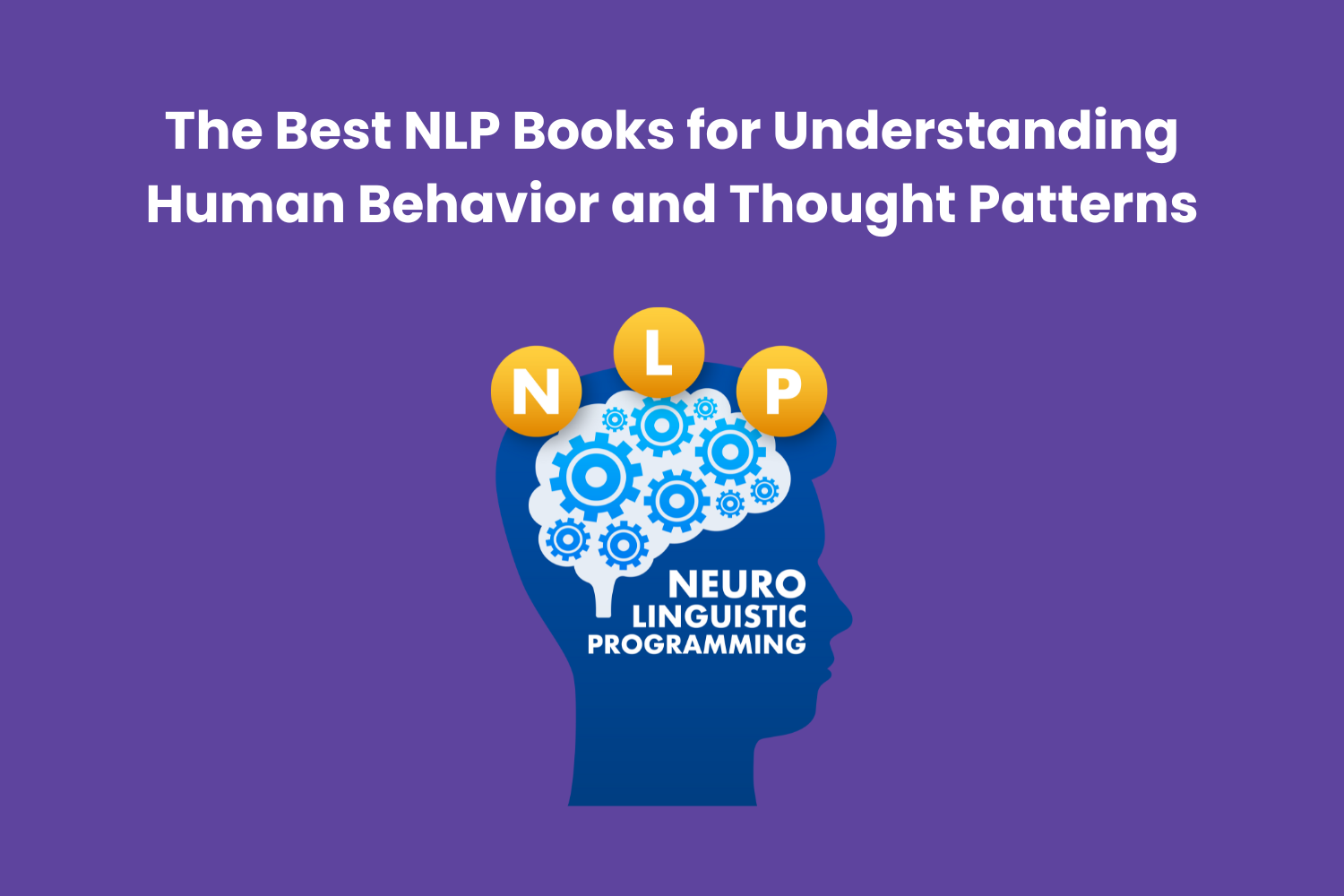Neuro-Linguistic Programming (NLP) stands as a powerful guide in this exploration for the intricacies of human behavior and thought patterns. For those seeking to deepen their understanding of NLP, books serve as invaluable companions, offering insights, techniques, and perspectives from experts in the field. In this blog, we unveil a curated list of the best NLP Books, essential for those on the path of comprehending and mastering human behavior. Whether you’re a seasoned practitioner or just embarking on your NLP Training Course, these books provide a gateway to the fascinating world of NLP.
Table of Contents
- “NLP: The Essential Guide” by Tom Hoobyar, Tom Dotz, and Susan Sanders
- “Frogs into Princes: Neuro Linguistic Programming” by Richard Bandler and John Grinder
- “The Structure of Magic I: A Book About Language and Therapy” by Richard Bandler and John Grinder
- “Sleight of Mouth: The Magic of Conversational Belief Change” by Robert Dilts
- “NLP at Work: The Essence of Excellence” by Sue Knight
- “The Ultimate Introduction to NLP: How to Build a Successful Life” by Richard Bandler
- “Patterns of the Hypnotic Techniques of Milton H. Erickson, M.D. Volume 1” by Richard Bandler and John Grinder
- “NLP Workbook: A Practical Guide to Achieving the Results You Want” by Joseph O’Connor
- “Influence: Science and Practice” by Robert B. Cialdini
- “The Structure of Magic II: A Book About Communication and Change” by Richard Bandler and John Grinder
- Conclusion
1. “NLP: The Essential Guide” by Tom Hoobyar, Tom Dotz, and Susan Sanders
This book provides a thorough and approachable introduction to NLP by covering the essential ideas and practises that makeup Neuro-Linguistic Programming. Its helpful hints and examples make it a great introduction to natural language processing (NLP) for those just starting.
2. “Frogs into Princes: Neuro Linguistic Programming” by Richard Bandler and John Grinder
“Frogs into Princes” is a seminal work in neuro-linguistic programming (NLP) that draws on workshop notes from NLP co-creators Bandler and Grinder. This book explores the fundamentals of neuro-linguistic programming (NLP), giving readers an inside look at how this method might alter one’s habits of thinking and behaviour.
3. “The Structure of Magic I: A Book About Language and Therapy” by Richard Bandler and John Grinder
In a groundbreaking study, Bandler and Grinder investigate the language underpinnings of natural language processing. The book presents the Meta-Model, a collection of linguistic patterns that impact how we understand and express ourselves. Anyone seeking to employ NLP methods successfully would do well to familiarise themselves with the ideas stated in this book.
4. “Sleight of Mouth: The Magic of Conversational Belief Change” by Robert Dilts
Renowned neuro-linguistic programmer Robert Dilts delves into the science and practice of persuasion in his book “Sleight of Mouth.” The book lays forth a set of linguistic patterns that practitioners might use to successfully influence and change beliefs. If you want to learn how to communicate effectively in a way that changes people’s beliefs, this is a great resource for you.
5. “NLP at Work: The Essence of Excellence” by Sue Knight
If you’re looking for a practical guide to using NLP at work, “NLP at Work” by Sue Knight is a must-have. In this book, the author delves into how natural language processing (NLP) may be used in the workplace, covering topics such as leadership, problem-solving, and communication. It connects the dots between NLP’s theoretical foundations and its practical business applications.
6. “The Ultimate Introduction to NLP: How to Build a Successful Life” by Richard Bandler
This book is a success blueprint by Richard Bandler that condenses the core ideas of NLP. Various subjects are covered in The Ultimate Introduction to NLP, including goal setting, overcoming obstacles, and producing sustainable change. Anyone, from complete novices to seasoned pros, will enjoy Bandler’s book because of his captivating writing style.
7. “Patterns of the Hypnotic Techniques of Milton H. Erickson, M.D. Volume 1” by Richard Bandler and John Grinder
Notable physician and hypnotherapist Milton H. Erickson was a major contributor to neuro-linguistic programming (NLP) development. Bandler and Grinder provide an in-depth exploration of the patterns that have become fundamental to NLP in this work, which analyses and presents Erickson’s hypnotic procedures. Mastering Ericksonian methods improves one’s capacity to effect change on a subliminal level.
8. “NLP Workbook: A Practical Guide to Achieving the Results You Want” by Joseph O’Connor
Those interested in learning how to use NLP concepts in their daily lives may find Joseph O’Connor’s “NLP Workbook” invaluable. An entertaining and dynamic resource for anybody devoted to their NLP journey, the book offers practical exercises, case studies, and self-assessment tools.
9. “Influence: Science and Practice” by Robert B. Cialdini
Although Cialdini’s “Influence” is a classic in persuasive psychology, it is not limited to neuro-linguistic programming (NLP). Complementing instruction in NLP, familiarity with the concepts presented here will provide light on the elements that shape human behaviour. If you want to know all there is to know about the dynamics of communication and influence, this book is a must-have.
10. “The Structure of Magic II: A Book About Communication and Change” by Richard Bandler and John Grinder
The “Structure of Magic” series continues with volume 2, which explores the interplay between dialogue and transformation in more detail. This second volume expands upon the first by delving further into complex language patterns and how they may pave the way for life-altering dialogues. It is an essential read for anyone seeking to enhance their expertise in NLP.
Conclusion
Exploring the world of neuro-linguistic programming (NLP) through informative publications offers valuable insights into human behavior and cognitive patterns. Whether you’re a novice or an expert in NLP, these resources contribute to a well-rounded understanding of the subject, encompassing fundamental concepts and advanced language patterns. Acquiring such skills is pivotal for navigating the complexities of human interaction and making a positive impact. If you’re looking to enhance your capabilities further, consider exploring Business Skills Courses to complement your knowledge and broaden your expertise.
